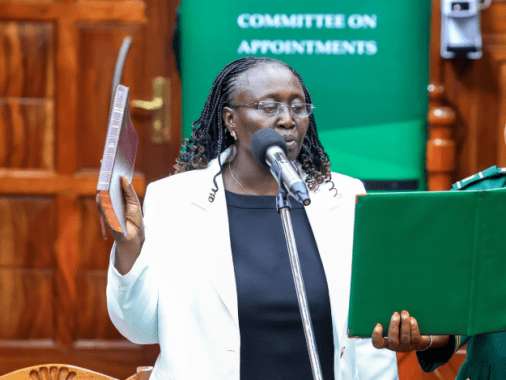Better services start with who gets hired
By Levi Obonyo, April 18, 2025Parliament has just concluded one of its constitutional responsibilities. This week, it forwarded two names of individuals for appointment to the Cabinet – one to fill the Gender, Culture, Arts and Heritage docket, which has been vacant for some time, and the other for the Public Service and Human Capital Development docket, which Justin Bedan Muturi recently vacated.
Before her appointment, Hannah Wendot Cheptumo was hardly known beyond the boundaries of Baringo County, where her late husband served as a senator. The appointment thrust the former civil servant into the public limelight, and Parliament was tasked with assessing her suitability for the post.
The other appointee, Geoffrey Kiringa Ruku, was comparatively well known. He was drawn from the list of sitting parliamentarians from Embu. Ruku has been a constant face on morning television shows, where he could be relied upon to defend the government. His political position allowed him to stand out as a sore thumb from a region that, while previously supporting the government, now looks at the same administration wearily.
Parliament was also vetting another list of nominees for principal secretary positions – some of whom were little known, while others may have been in the public domain for some time.
This process is conducted publicly, with the vetting conducted on live television. Thus, the public can assess the candidates’ responses to the questions and decide whether they are suitable or unsuitable for the positions.
The result has often been a mixed bag. In some instances, it is comical, with the candidates appearing to lack any clue about the role they seek to serve. Of course, most times, it would be obvious that the candidates had done their homework and could respond intelligently to the questions.
However, the results often tend to be the same. At the end of the grilling, the candidates are cleared, the good and the bad, and their names are forwarded to the President, who almost immediately gazettes them. The swearing-in follows this.
It raises the question of whether, while the process is a constitutional requirement, it serves the Constitution’s intended purpose. When the process was introduced through a bill sponsored by the then Garsen MP Danson Mungatana, it sought to avoid mischief in appointments by blocking unsuitable candidates.
Candidates were to be screened for qualification, experience, and integrity, among others, and to block backroom deals that would give the executive a free hand to appoint people.
Since then, to give some credit to the process, a few candidates have failed to make it through Parliament. But it was obvious that their performance during the screening was so bad that it would have been an embarrassment both to the House and the executive.
But among those who have made it through, some have done so against clear opposition, and the public wonders at their potential to deliver.
This week, the gender nominee came under clear scrutiny, as her view of the issues in her intended docket raised questions about her capacity to preside over them.
Such candidates may quickly learn on the job and still deliver. But that is not always the case. Many finish their duty tour without much to show for it. Given the options available to the executive, it is not clear why it would limit its choices to barely qualified candidates and for Parliament to go along with them.
Kenyans tend to compare their government with others worldwide that are making progress in improving their people’s lives. However, that task starts with the quality of the people assigned the responsibility to deliver.
The wide gap in our case is not a lack of awareness of what is needed to deliver but rather the will to deliver, a responsibility that lies squarely with the executive. However, the tragedy is the legislature going along with it. Among the responsibilities of the legislature is oversight. But they give it leap service. Thus the blame can’t be with the executive alone, but the legislative arm of the government as well.
— The writer is the Dean of Daystar University’s School of Communication
